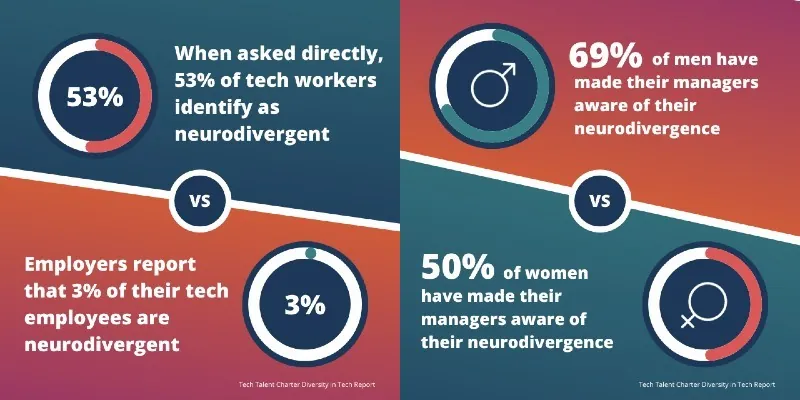A new report has claimed that neurodivergence is massively underestimated in the technology industry.
The Diversity in Tech report, published by non-profit the Tech Talent Charter, revealed shockingly low reported levels of neurodivergent people in tech – just 3% versus 15-20% estimates of the wider population – according to employers.
Yet a separate poll of UK tech workers, also conducted by TTC and published in the report, found that more than half of tech workers identify as neurodivergent when asked directly, highlighting significant failings in the diversity ‘self ID’ process across the industry.
TTCs annual report is a collaboration between over 700 UK organisations sharing their diversity data to provide candid insights into the UK tech economy. Using data from 708 companies, including sponsors Global, HP, Lloyds Banking Group, Nominet, PwC, Sky and BAE Systems Digital Intelligence, the report reveals the latest statistics on inclusion, equity and diversity drawing on a sample of 230,000 UK tech employees.

The report is the largest of its kind, and is also backed by the Department for Science Innovation and Technology (DSIT).
The report also reveals uncomfortable new statistics on several other diversity areas, indicating the tech industry is not representative of the wider UK working population.
This includes disability in tech (6% compared to 23% of the working population), socioeconomic ‘working class’ diversity (9% compared to 39% of the UK population), as well as trans representation (0.17%), gender and ethnic diversity in software engineering (20% and 22% respectively), and gender and ethnic diversity in senior tech roles (21% and 14% respectively).
All measures of diversity in tech lag behind other UK benchmarks, but despite this alarming news, TTC warns that companies are defunding their D&I efforts, a trend which will only make these problems worse.
“Companies are abandoning D&I initiatives, citing the tough economic climate as the reason,” said Karen Blake, co-CEO of the Tech Talent Charter. “The unfortunate fact of the matter is that ditching D&I is only going to hurt their productivity and performance in the long run.
“More concerningly, we’re observing a trend of businesses with deeper pockets stepping away from areas of D&I which could create troublesome headlines.
“Unfortunately the truth of the issue is that businesses are using the economic climate as a convenient excuse to bin any D&I initiatives that could expose them to criticism in the public eye – something that is impossible to avoid in our highly-polarised society. It signals a failure in leadership to step up to our biggest challenges.”
‘No excuses!’ Martha Lane Fox challenges tech leaders on diversity
Representation of women in tech, which has been tracked by the TTC for the last four years, has reached a new high of 29%, but this meagre progress is set to backslide as companies defund their D&I work and the proportion of women in senior tech roles falls compared to last year.
In response, the report issues a strong challenge to business leaders on what needs to be done to turn the tide. The report provides practical and unique insights on activity at companies that are doubling down on D&I, including a list of the most popular D&I partners and resources companies are using to bolster their D&I work, the most common KPIs, business targets and goals for D&I, and top actions to support each of the different areas of D&I practice.
Investment platform launches in Birmingham for underserved founders
Blake added: “68% of our employers are measuring neurodiversity in their workforce, and whilst it’s promising to see increasing awareness of neurodiversity in business, this progress is only meaningful if we are also creating work environments that actually support – not just publicise – neurodivergence.
“Only 69% of neurodivergent men and just 50% of neurodivergent women have told their line managers about their neurodivergence, so companies clearly need to work on building trust with employees that enables them to disclose their neurodivergence and receive the adjustments and support to which they are entitled.”
Minister for Tech and the Digital Economy Saqib Bhatti said: “Our tech sector is a global success story – the UK was the third country to achieve a $1 trillion tech sector valuation and since 2000 we have created 152 unicorns. Tech plays a vital role in driving growth and generating jobs nationwide.
“However, as this important report makes clear, our tech sector does not reflect the UK as a whole – something we must work together to solve. I’m proud to be the UK’s first Muslim Technology Minister, and I understand that this is not just the right thing to do, it is also the smart thing to do to unlock the full potential of innovation across Britain.”



